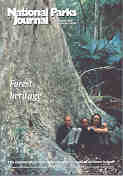
Back to Contents

Back to Contents |
|
Burning forests at the Frontline
The 11th of November has a special place in our society, marking the ceasefire on the western front in World War 1. It is a sad irony that this was the day Premier Bob Carr, a man proud of his knowledge of history and his conservation record, moved on a decision which could invoke confrontation with conservationists over the future of the western woodlands. The Premier declared his support in the NSW Parliament for a silicon smelter at Lithgow which will consume at least 160,000 tonnes a year of native forest as charcoal, drawn from western NSW.
We have written previously of this threat to the remnant woodlands of the Central West – in particular Goonoo near Dubbo and the historic Pilliga – and the wood- lands of the New England Table- lands. This proposal attacks the ecological heart of these forests by targeting the ironbarks, box and other eucalypts which are crucial to the continuing survival of more than 30 listed threatened species. These include the na- tionally listed mallee fowl and regent honeyeater, along with other forest wildlife such as bats, owls, gliders, koalas and lizards.
The Premier has stated that the timber supplied to the plant will be produced on an environ- mentally sustainable basis. This is a nonsense as no environmental impact study for regional logging operations has ever been done in the Central West. The 1998 regional forest assessments for the North East forests and consequent Regional Forestry Agreements, which included the New England Table- lands, have been driven through without any reference to such a major new logging operation. Indeed I believe that the conservation movement and the public have been deliberately deceived, as the Government was already engaged in discussions with Japanese and Western Australian mining companies on the silicon project.
On the same day that the Premier made his announcement, the Planning Minister, Andrew Refshauge – responsible for regional forest assessments – announced a forestry assessment for the Central West. My enquiries have revealed that this assessment will be done in less than three months; it is to be completed by the end of February 2000 to allow the Government to meet the miners’ timetable. Other regional forest assessments have taken between two and three years! Leading scientists - ecologists, zoologists and botanists – familiar with the western woodlands have advised NPA that the minimum period is 18 months to carry out biological surveys for an environmental assessment with any credibility.
The Premier and the Planning Minister have ignored calls by NPA for a full environmental impact statement (EIS) under the Environmental Planning and Assessment Act for the timber supply. In a grand farce, the Government is proceeding to assess three separate development applications and associated EIS’s for the sites of the silicon smelter, a related quarry and the charcoal plant - none of which will address the environ- mental impact of the timber supply. The reason is obvious: once the Government has gone through the motions of a regional forestry assessment under its controversial new forestry legislation, then it is freed of the likelihood of any challenge under the planning laws.
The Premier has started a battle with wide implications for the future of the western woodlands as well as for his environ- mental credibility.
Noel Plumb
Executive Officer